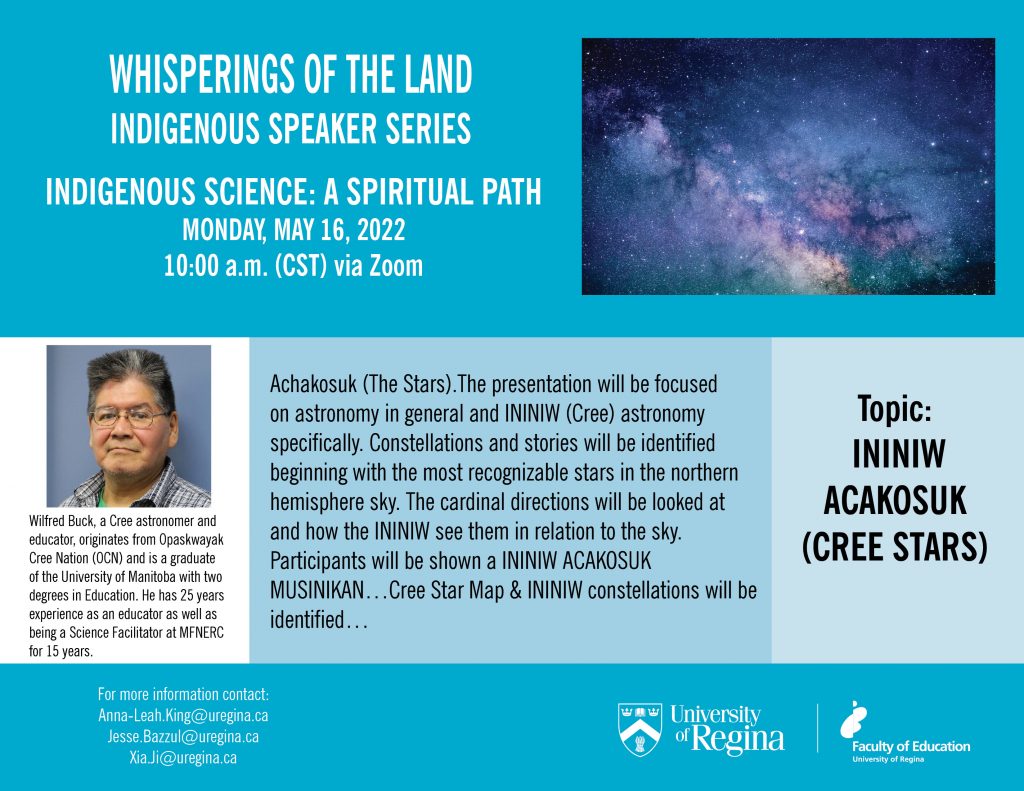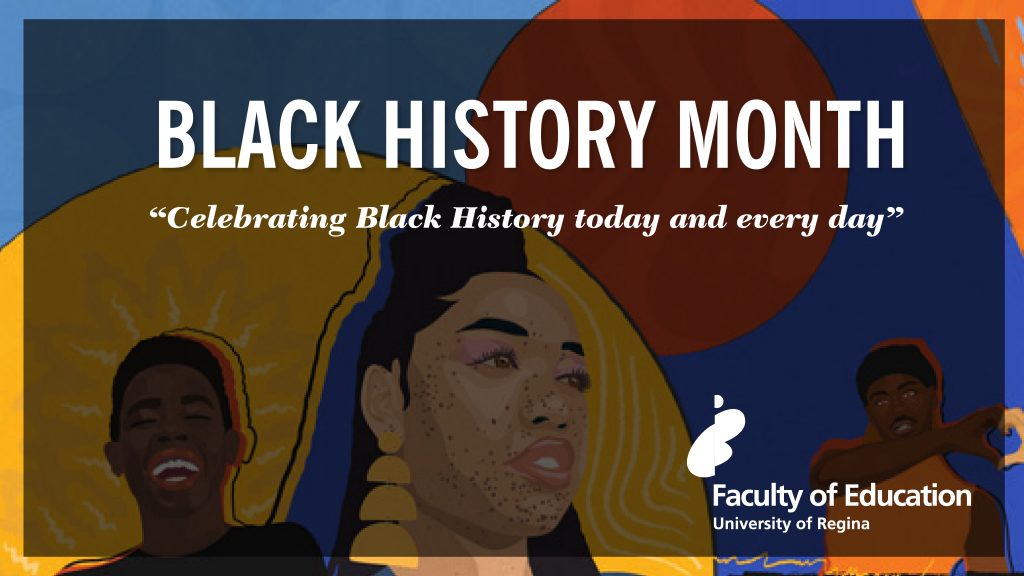
Category: Equity Diversity Inclusion


Immigrant Settlement and Community-Newcomer Integration in South Central Saskatchewan study
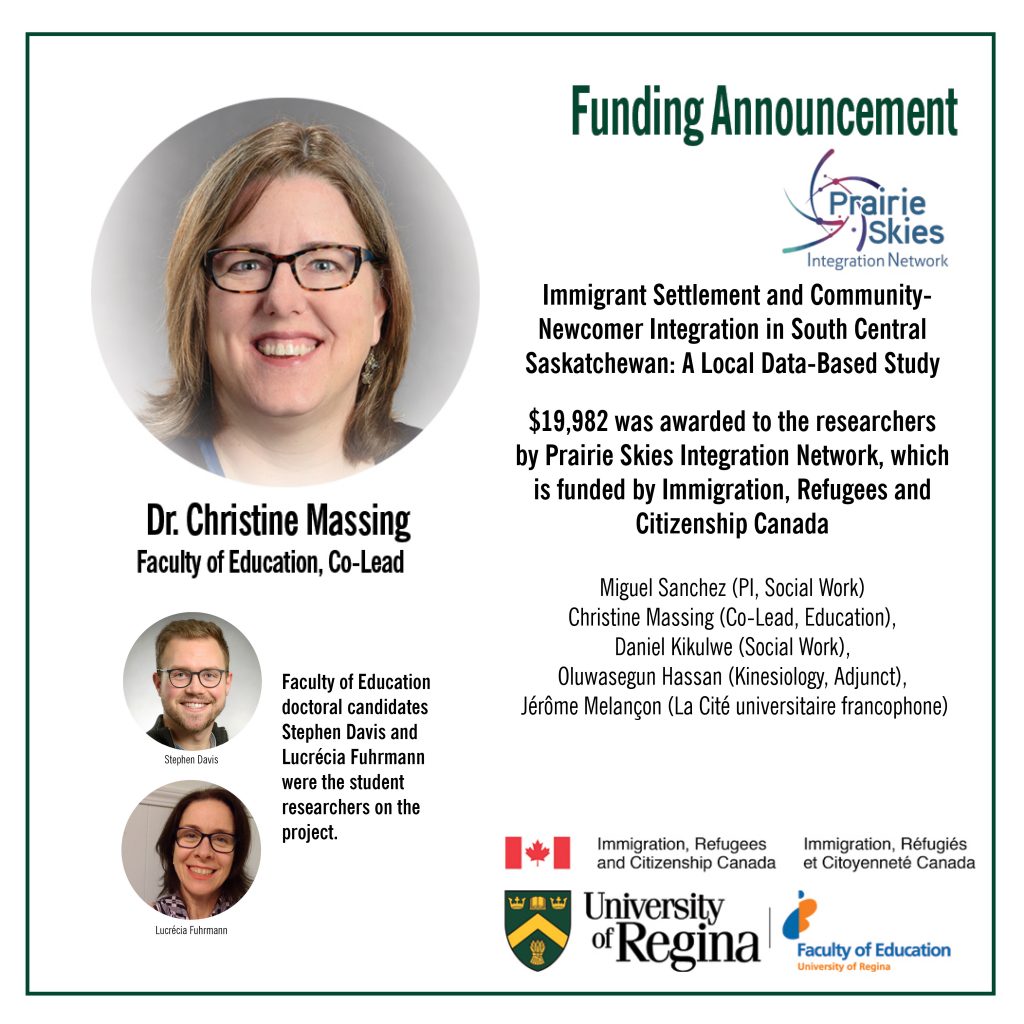 Congratulations to this group of researchers including #UREdu‘s Dr. Christine Massing and doctoral candidates Stephen Davis and Lucrécia Fuhrmann. The study “Immigrant Settlement and Community-Newcomer Integration in South Central Saskatchewan: A Local Data-Based Study” received $19, 982 from Prairie Skies Integration Network – Moose Jaw Region’s LIP.
Congratulations to this group of researchers including #UREdu‘s Dr. Christine Massing and doctoral candidates Stephen Davis and Lucrécia Fuhrmann. The study “Immigrant Settlement and Community-Newcomer Integration in South Central Saskatchewan: A Local Data-Based Study” received $19, 982 from Prairie Skies Integration Network – Moose Jaw Region’s LIP.
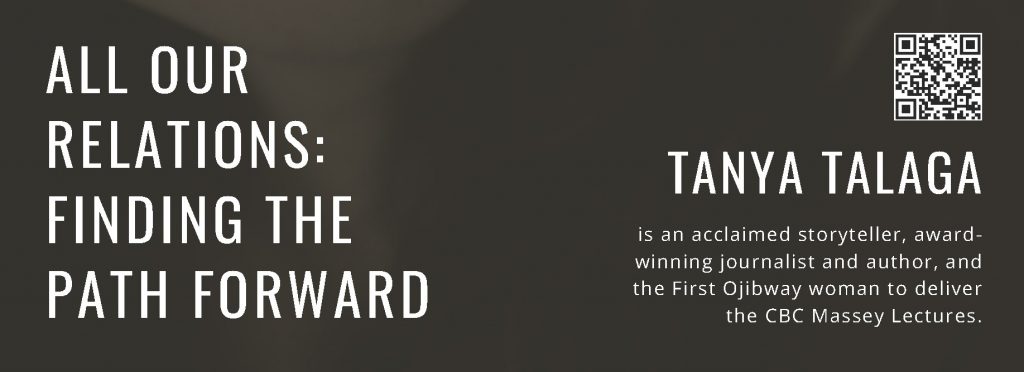
Event: All Our Relations: Finding the Path Forward with Tanya Talaga
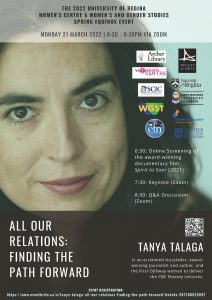 Join us March 21, 2022 6:30 p.m. (CST) for a Zoom presentation by acclaimed Canadian storyteller, journalist, author, and CBC Massey lecturer Tanya Talaga!
Join us March 21, 2022 6:30 p.m. (CST) for a Zoom presentation by acclaimed Canadian storyteller, journalist, author, and CBC Massey lecturer Tanya Talaga!
Tanya Talaga, of Anishinaabe and Polish descent, is the author of Seven Fallen Feathers: Racism, Death and Hard Truths in a Northern City.
Everyone is welcome!
Register for the event at https://www.eventbrite.ca/e/tanya-talaga-all-our-relations-finding-the-path-forward-tickets-267708622697
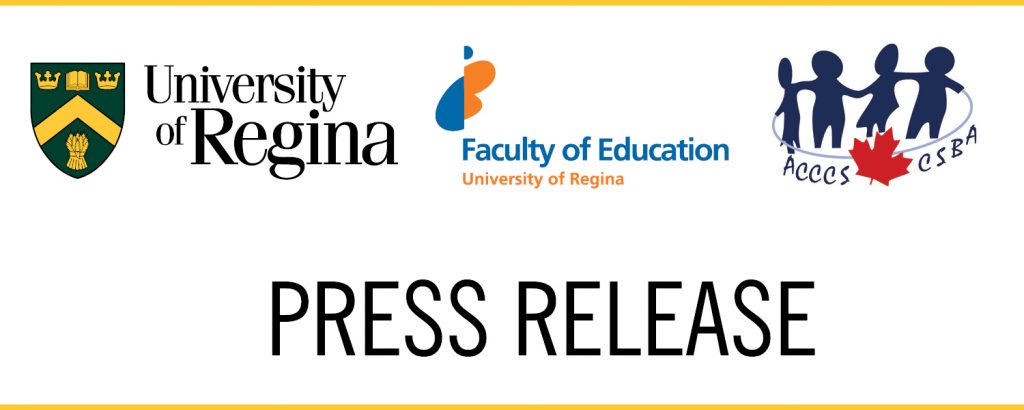
University of Regina and Canadian School Boards Association (CSBA) sign equity, diversity, and inclusion research agreement
The Canadian School Boards Association (CSBA) and University of Regina’s Faculty of Education are pleased to announce a new $93,450 research agreement, in which the Faculty of Education will conduct research and provide deliverables for Phase 2 of the CSBA’s anti-racism strategy.
“Systemic anti-racism is a fundamental priority for the CSBA and its member organizations,” states CSBA President Laurie French. “Review and revision of policies, including organizational structure and procedures, has enormous potential for permanent change to set direction and expectations for local school systems as a component of this work. We are pleased and impressed that improving equity, diversity, and inclusion is unanimously supported by the Board of Directors on behalf of their local school boards, and we are very grateful to be led and supported by the exceptional team at the University of Regina.”
The CSBA has completed Phase 1 of an anti-racism strategy which included self-assessments of the CSBA Board of Directors and a review of CSBA Policies. Phase 2 will include:
- Developing a plan for implementing Phase 1 policy recommendations;
- Developing equity, diversity and inclusion self-assessment documents for member associations and their respective school boards in communities across Canada;
- Launching a national campaign to increase the diversity of locally elected school boards; and
- Creating governance and trustee learning modules to increase awareness of the systemic racism in Canada that continues to disadvantage students and families who are Indigenous, Black or otherwise racialized.
“In response to the momentum around acknowledging and seeking to address systemic racism in Canadian society, the Faculty of Education — whose commitments are fundamentally grounded in the belief that schools can be incubators for truly just and pluralistic societies – is grateful to be able to partner with the Canadian School Boards Association,” says Dr. Jerome Cranston, Dean of the Faculty of Education and principal investigator for the research project.
The project will be supported by the newly formed Centre for Educational Research, Collaboration, & Development (CERCD), which was established, according to Dr. Andrea Sterzuk, Director of the CERCD, “to support educational researchers and research communities in conducting educational research and development projects that are meaningful to, and serve the needs of, diverse communities in local, provincial, national, and/or international contexts.”
The project is in alignment with the stated objectives of both the CSBA and the Faculty of Education. The CSBA states that it is “committed to promoting equal access opportunities for all students … by working to remove systemic barriers, address racism and adopt an intentional approach to equity, diversity, and inclusion in the work of provincial school board associations.” And the Faculty of Education “aspires to be a leader in innovative and anti-oppressive undergraduate and graduate research, scholarship, teaching, learning and service.” (Strategic Plan 2021 – 2026)
This project is being conducted from January 1, 2022 to June 30, 2023.
For an interview with Dr. Jerome Cranston, please contact him directly by email: education.dean@uregina.ca
For an interview with CSBA, please contact executivedirector@cdnsba.org
_________________________________________
L’Université de Regina et l’Association canadienne des commissions/conseils scolaires (ACCCS) signent un accord de recherche sur l’équité, la diversité et l’inclusion
L’Association canadienne des commissions/conseils scolaires (ACCCS) et la Faculté d’éducation de l’Université de Regina sont heureux d’annoncer un nouvel accord de recherche de 93 450 $, selon lequel la Faculté d’éducation effectuera des travaux de recherche et fournira des résultats tangibles dans le cadre de la phase 2 de la stratégie de lutte contre le racisme de l’ACCCS.
« La lutte contre le racisme systémique est une priorité fondamentale pour l’ACCCS et ses organismes membres », d’affirmer Laurie French, présidente de l’ACCCS. « L’examen et la révision des politiques, y compris la structure et les procédures organisationnelles, offrent un énorme potentiel de changement permanent qui fixe une orientation et des attentes pour les systèmes scolaires locaux comme composante de ce travail. Nous sommes enchantés et impressionnés du fait que le conseil d’administration, au nom des commissions/conseils scolaires locaux, appuie à l’unanimité l’amélioration de l’équité, la diversité et l’inclusion, et sommes très reconnaissants de la direction et du soutien apportés par l’équipe exceptionnelle de l’Université de Regina. »
L’ACCCS a terminé la phase 1 d’une stratégie de lutte contre le racisme qui comportait des autoévaluations du conseil d’administration de l’Association ainsi qu’un examen de ses politiques. La phase 2 comprendra :
- L’élaboration d’un plan de mise en œuvre des recommandations stratégiques de la phase 1;
- L’élaboration de documents d’autoévaluation de l’équité, la diversité et l’inclusion à l’intention des associations membres et de leurs commissions/conseils scolaires respectifs dans les communautés partout au Canada;
- Le lancement d’une campagne nationale visant à accroître la diversité des commissions/conseils scolaires élus à l’échelle locale; et
- La création de modules d’apprentissage sur la gouvernance à l’intention des commissaires et des conseillers scolaires en vue d’accroître la sensibilisation au racisme systémique au Canada qui continue de désavantager les élèves et les familles autochtones, de race noire ou de minorités raciales.
« En réponse à l’élan autour de la reconnaissance du racisme systémique au sein de la société canadienne et du désir de l’éliminer, la Faculté d’éducation – dont les engagements sont fondamentalement ancrés dans la conviction que les écoles peuvent servir de pépinières de sociétés véritablement justes et pluralistes – est heureuse de pouvoir établir un partenariat avec l’Association canadienne des commissions/conseils scolaires », d’affirmer le Dr Jerome Cranston, doyen de la Faculté d’éducation et chercheur principal du projet de recherche.
Le projet sera appuyé par le nouveau Centre for Educational Research, Collaboration, & Development (CERCD), qui, selon la Dre Andrea Sterzuk, Directrice du CERCD, a été créé « pour soutenir les chercheurs en éducation et les communautés de recherche dans la réalisation de recherches en éducation et de projets de développement qui sont importants pour les communautés diversifiées et qui répondent à leurs besoins dans des contextes locaux, provinciaux, nationaux et/ou internationaux. »
Le projet est conforme aux objectifs énoncés de l’ACCCS et de la Faculté d’éducation. L’ACCCS souligne qu’elle s’est « engagée à promouvoir l’égalité des chances pour tous les élèves … en déployant des efforts pour lever les obstacles systémiques, éliminer le racisme et adopter une approche délibérée à l’équité, la diversité et l’inclusion dans le travail des associations provinciales de commissions/conseils scolaires. » Pour sa part, la Faculté d’éducation « vise à être un chef de file en matière de recherche, d’érudition, d’enseignement, d’apprentissage et de service novateurs et anti-oppression aux cycles premier et supérieurs. » (Plan stratégique 2021-2026 [traduction libre])
Le projet se déroule à partir du 1er janvier 2022 jusqu’au 30 juin 2023.
Pour une entrevue avec le Dr Jerome Cranston, prière de lui écrire directement par courriel : education.dean@uregina.ca
Pour une entrevue avec l’ACCCS, prière d’écrire à executivedirector@cdnsba.org
___________________________________________
About the University of Regina
The University of Regina—with campuses located on Treaty 4 and Treaty 6 territories, the ancestral lands of the Cree, Saulteaux, Dakota, Lakota and Nakoda nations and the homeland of the Métis—is a comprehensive, mid-sized university that traces its roots back to the creation of Regina College in 1911. Today, more than 16,000 students study within the University’s 10 faculties, 25 academic departments/schools, 18 research centres and institutes, and three federated colleges (Campion College, First Nations University of Canada, and Luther College). The University of Regina has an established reputation for excellence and innovative programs that lead to undergraduate, master’s, and doctoral degrees.
About the Canadian School Boards Association
The Canadian School Boards Association (CSBA) represents members from member associations serving close to four million elementary and secondary school students throughout Canada. Through its support of the public school systems, the CSBA supports excellence in school board governance and is committed to providing tools, leadership, professional development, and communication opportunities to trustees and commissioners across Canada as well as advocating for them on shared, national issues.
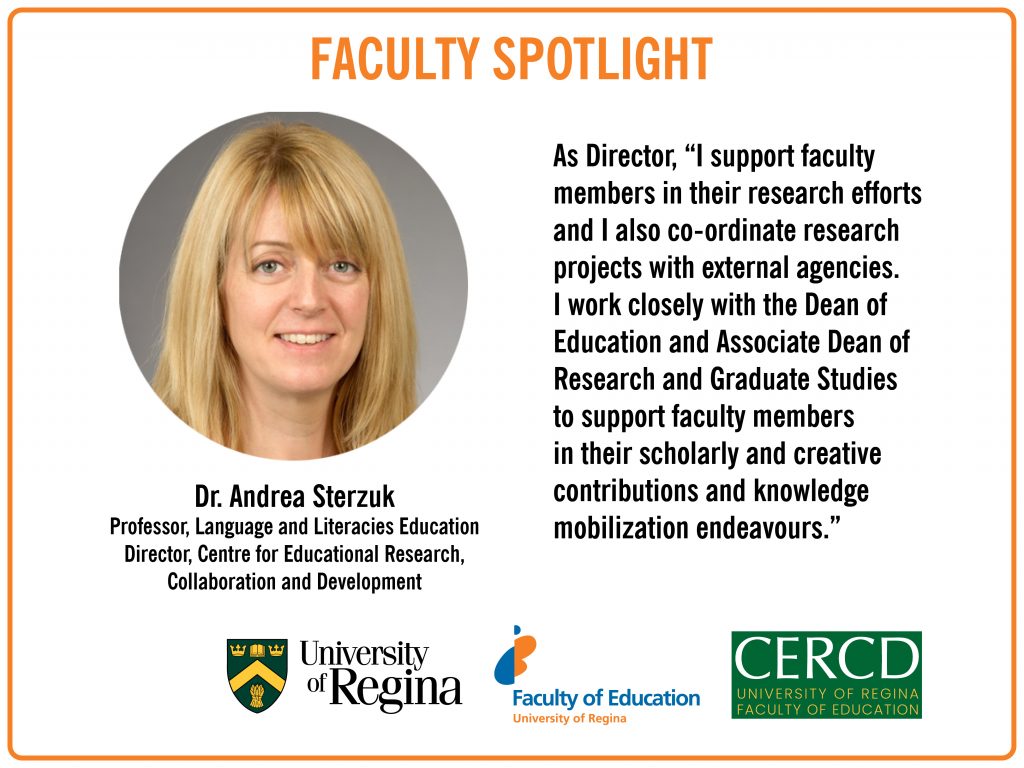
Spotlight on Dr. Andrea Sterzuk, Director of the CERCD
Today our spotlight shines on Dr. Andrea Sterzuk who has been a professor of Language and Literacies Education with the Faculty of Education since the fall of 2007. In January 2021, Dr. Sterzuk took on a new role as Director of the Centre for Educational Research, Collaboration and Development (formerly SIDRU).
The Centre for Educational Research, Collaboration and Development (CERCD) is a research unit based in the Faculty of Education at the University of Regina. CERCD supports educational researchers and research communities in conducting educational research and development projects that are meaningful to, and serve the needs of, diverse communities in local, provincial, national, and/or international contexts.
In her role as Director, Dr. Sterzuk says, “I support faculty members in their research efforts and I also co-ordinate research projects with external agencies. I work closely with the Dean and Associate Dean, Research and Graduate Studies to support faculty members in their scholarly and creative contributions and knowledge mobilization endeavours.”
As highlights of her role, Dr. Sterzuk points to the CERCD Lunch & Learn series that her team is hosting with communications experts, designed to help researchers learn to share their research stories with the public. The research unit’s new website is launched and the renovations on the CERCD’s office space are nearly complete. Dr. Sterzuk adds, “There are also several external research projects underway. For example, Dr. Pamela Osmond-Johnson (Associate Dean, Student Services and Undergraduate Programs) is the principal investigator on a project that investigates the continual professional learning and currency of practice for registered teachers in the province of Saskatchewan. This project is a partnership with the Saskatchewan Professional Teachers Regulatory Board and is supported administratively by CERCD.”
Exciting news will be released soon about a new partnership. Stay tuned!
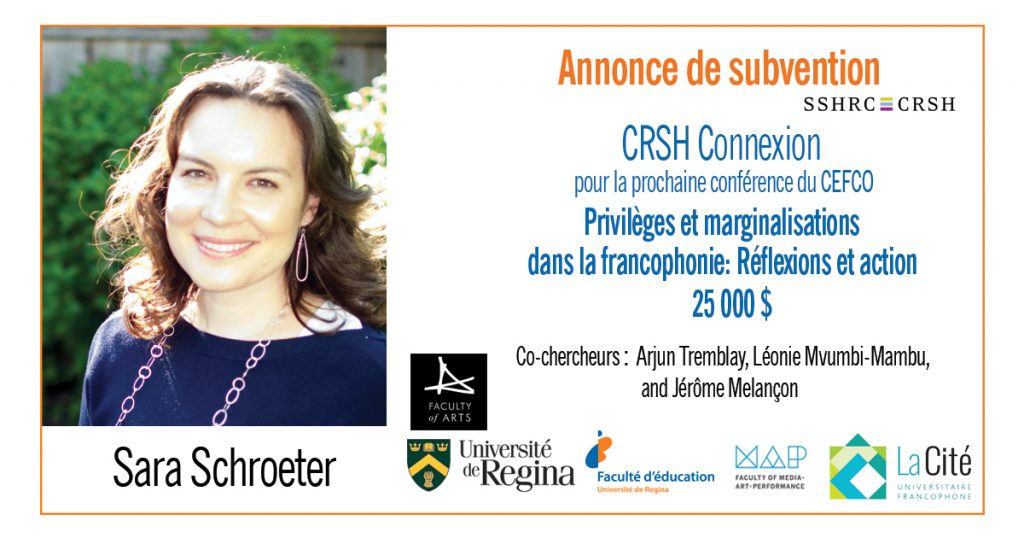
Funding announcement | Dr. Sara Schroeter
Congratulations to #UREdu Dr. Sara Schroeter (PI) and co-investigators: Dr. Arjun Tremblay, Dr. Léonie Mvumbi-Mambu, and Dr. Jérôme Melançon on receiving a $25,000 SSHRC/CRSH Connections Grant to host the upcoming Center for Franco-Canadian West Studies (CEFCO) conference “Privilèges et marginalisations dans la francophonie: Réflexions et action”.
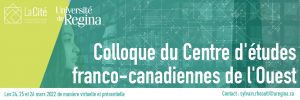 Conference details at https://lacite.uregina.ca/fr/crfm/colloques/colloque-du-centre-d-etudes-franco-canadiennes-de-l-ouest-cefco
Conference details at https://lacite.uregina.ca/fr/crfm/colloques/colloque-du-centre-d-etudes-franco-canadiennes-de-l-ouest-cefco
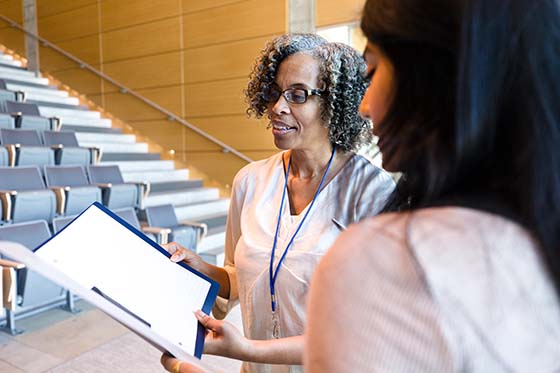
New Black Teachers Matter Scholarship
Donors to the U of R share in the University’s commitment to creating and promoting a more equitable system that fosters diversity and inclusion.
By University Advancement and Communications Posted: September 13, 2021
“This commitment to well-being and belonging was no more evident than in the $25,000 donated by Agnes Stephanson-Cooke to endow the Black Teachers Matter Scholarship in 2020 – an award that will support a Black undergraduate student in pursuing a degree in the Faculty of Education in their final year.
“It’s a huge commitment by Agnes to trust us and our Faculty and our University to carry forward this gift with her name,” said Dr. Jerome Cranston, Dean of the Faculty of Education at the University of Regina. “It brings me tremendous joy to know that there are people like Agnes out there. Her foresight and her willingness to have her name associated with this gift is huge.”
Dr. Cranston was quick to give credit to his Faculty of Education colleague Stephen Davis, who came up with the concept and name of the award. “I felt that this was needed to recognize the important role of Black educators in Saskatchewan and celebrate the brilliant and gifted educators that we have at the University of Regina,” Davis said. Both Dr. Cranston and Davis recognize the enormous impact that the award will have.
“Representation matters. We don’t only need Black teachers for Black students, we need Black teachers for white students,” Dr. Cranston said. “This award is going to support changing the teaching workforce and it’s going to do it in a way that even further identifies the U of R as a place where we are inclusive, and we are respectful.”
Read the full story on the U of R Front Page
If you would like to help a student in need, visit our donor page and consider supporting one of our Faculty’s funding priorities: https://giving.uregina.ca/pages/fundraising-priorities/education
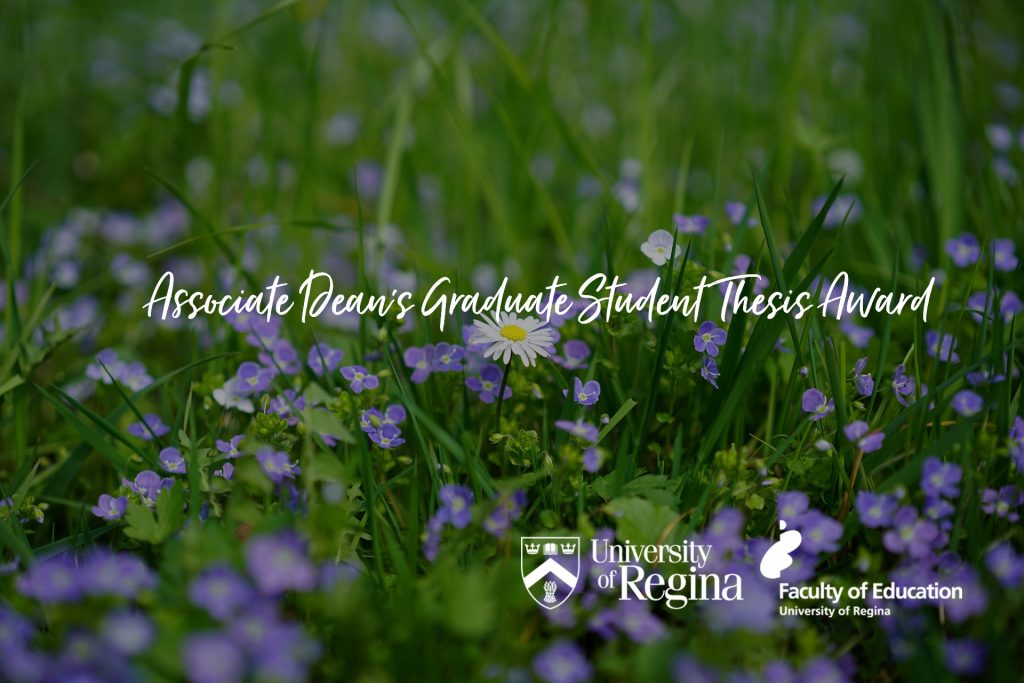
Inaugural recipients of the Associate Dean’s Graduate Student Thesis Award

 Congratulations to the 2021 inaugural recipients of the #UREdu Associate Dean’s Graduate Student Thesis Award: Dr. Needal Ghadi (the Faculty of Education’s nominee for the Governor General’s Academic Gold Medal) and Dr. Rubina Khanam (BIPOC).
Congratulations to the 2021 inaugural recipients of the #UREdu Associate Dean’s Graduate Student Thesis Award: Dr. Needal Ghadi (the Faculty of Education’s nominee for the Governor General’s Academic Gold Medal) and Dr. Rubina Khanam (BIPOC).
The Faculty of Education Associate Dean’s Graduate Student Thesis Award was established to recognize the outstanding academic performance of thesis-based graduate students (Masters and PhD) in Education. Each recipient is a student in a graduate program in the Faculty of Education who has exemplified academic excellence and research ability, demonstrated leadership ability and/or university/community involvement, and whose thesis was deemed meritorious by the Examining Committee.
One award (of $2000) will go to an applicant who has self-identified as a Black, Indigenous, or person of colour (BIPOC).
The second award (of $2000) will go to the Faculty of Education nominee for the Governor General’s Academic Gold Medal (Spring) or the President’s Distinguished Graduate Student Award (Fall).

Researching representational practices in musical theatre
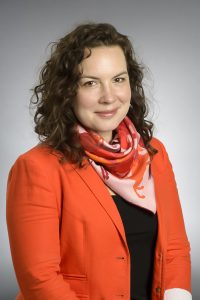
When Sara Schroeter set out to attend a local musical theatre production one evening, an outing with one of her children, she didn’t expect she would have to have difficult conversations with her family because of the problematic racial representations.
“As a mother of mixed-race children, when I started going to the musical theater and seeing the problematic representations and after talking with my husband and hearing him say the damage was already done, and that this was one of many, many experiences that our children will have, that they might not understand right now, but one day they will, and these experiences will have an accumulated impact [sigh]—that’s when I realized that this is what we are doing with musicals.”
Musical theatre is a popular and traditional feature in many high schools across North America, including Regina. When Schroeter first joined the Faculty of Education as an assistant professor of arts and drama education, she realized she needed to gain a better understanding of musical theatre:
“Musical theatre is what many of my students in Arts Ed understood theatre to be. I needed to better understand what’s going on in musical theatre. I was told that musicals are really big for the local high schools and the community attends these musical shows.”
Schroeter set out to investigate and says, “I went to two musical theatre productions the first year I was here and both had really problematic representations of either race or gender and sexuality—some of the most troubling representations that I have seen recently, certainly something I didn’t expect to see in 2016.”
Her experiences caused Schroeter to start questioning the pedagogical value of musical theatre. She wondered where teachers were drawing their inspiration from and how they were contending with issues of representation in a field that, she says, “is known to have quite a problematic history.”
In 2018, Schroeter’s wondering turned into a University of Regina, President’s Seed Funded research project entitled, “Staging Difference: Examining Representational Practices in Musical Theatre Productions in Regina Schools and on Professional Stages.”
Though a drama educator, this exploration into musical theatre has been a new focus for Schroeter, whose research has mostly focused on youth representations of self and other through drama.
“I study applied theatre and drama in education, and am interested in youth making their own stories and telling their own stories. My research has also examined representational practices, often drawing on critical race theory and cultural studies,” says Schroeter.
Schroeter’s research project involves two parts: “Part of my research is to look at what is going on in high schools, interviewing teachers, and part of it is to go and see contemporary progressive shows, or shows said to be doing progressive things.”
Though her research is not complete yet, and no in-depth analysis has been done on the data, Schroeter is able to share some of her understanding of the issues so far.
Musical theatre productions are essentially money makers, Schroeter says. As such, “they are meant to have an appeal to a large audience. To do this, they rely heavily on stereotypes and tropes to make easily recognizable characters so that everybody knows what story is being told. These representations always comes with issues.”
When musicals are purchased for reproduction at the high school level, as commercial enterprises, strictly guided by copyright law, there is little room for local teachers to make adaptations. This is a problem because, Schroeter says, there are “so many ways in which race, religion, and gender and heteronormativity are written into the productions as a way of telling a particular story about how Americans see themselves and the image they want to portray in American society.”
Summarizing Hoffman (2014) in The Great White Way, Schroeter says, “the musical is in essence part and parcel of the invention of Americanism and white supremacy, with roots in minstrel shows from the 1800s and early 1900s when performers did dress up with blackface, and used quintessential stereotypes, such as mammy.”
As a form of public pedagogy, Schroeter views high school musical theatre as “teaching all of those things that make up what we are understanding and learning—how we construct knowledge.” Referencing Donatella Galella’s work, Schroeter says that “musical theatre is a form of public pedagogy because it tells us stories about who we are and who we imagine ourselves to be.”
As an example, Schroeter points to Hamilton (2015), which is purported to be a very progressive musical production. She says, “Hoffman (2014) writes about songs in musicals, such as the song for change. The main character goes through immense change and the person who sings the song for change is usually a white character who has multiple dimensions, whereas characters of colour are presented as flat characters; they stay the same throughout the show. Hamilton (2015) plays with this by representing white characters through actors of colour. Actors of colour get to play this range of emotion and change, but it is still problematic because they are still representing White folks, so they haven’t changed and disrupted what happens in the structure of the musical.”
Schroeter highlights other problems with Hamilton (2015): “The way the American history is told through hip hop makes history relevant, but it also makes the history irrelevant, because it is a story from which the actors of colour in the cast have historically been excluded—in some ways a re-appropriation. Why aren’t they telling the story of the Haitian revolution or of the theft of lands; there are so many others stories that could have been told that would be relevant to the students who would then see their histories represented in the play. Instead they are being told what is ultimately a white story—a slave-owning story—that has been re-imagined to maybe include the possibility of mixed heritage in Alexander Hamilton, which perpetuates the idea that he was mixed race, but we don’t know that.”
Though musical theatre is problematic, Schroeter understands that it fulfills a purpose: “The musical fills this void in not requiring audiences to work very hard to understand what is going on in the story,” she says. Musicals also “bring various departments, music, dance, theatre, and art departments together for these wide scale productions that involve a lot of kids.”
Schroeter clarifies her position saying, “I’m not taking away from the bonding experience or artistic learning, but I want to know what these productions do to us as a public, pedagogically, and to students in particular, and also to acknowledge, as Gastambide-Fernandez & Parekh found in their 2017 study of arts programs, who is included in those productions and who is excluded historically in drama and theatre programs in our schools.” Schroeter is encouraged that increasingly IBPOC scholars, educators, and artists are raising their voices about this exclusion in representation and taking on leadership roles in musical theatre, such as director and producer.
Schroeter still wants to see plays integrate music and art with drama, but she would love to see them be stories relevant to youth. “I’m not going to deny that kids want to do Grease (1971). I get that teachers are in a delicate position of having to do what kids want and push them.”
Avant garde theatre is one alternative to musicals because “avant garde theatre artists are often trying to avoid stereotypes or trouble the tropes. Then you get really controversial theatre because opinion is divided—with some hating and some loving it,” says Schroeter. Likewise, “when you make original theatre and stories told by students and their points of views, sometimes parents don’t like the stories that kids have to tell and sometimes the stories are experimental and people don’t get it.”
Through interviews with local drama teachers, Schroeter is finding some teachers “that just won’t do the musical because they are going to create plays that involve music and singing, but not musicals—once you open that door, you can’t close it because that is what people will want and expect.” With student-created theatre, Schroeter says, “you can cast more diversely, and the tools you are giving students are much bigger because you are training them as story tellers.” Other teachers in her study, she says, “are aware of the issues, and are trying to address stereotyping and problematic representational practices by having conversations with their students about it and by not letting the problems disappear.”
So far, Schroeter says, “my research is reinforcing what I already know about the value of arts education—giving students the tools to come together and make and create original art.”
